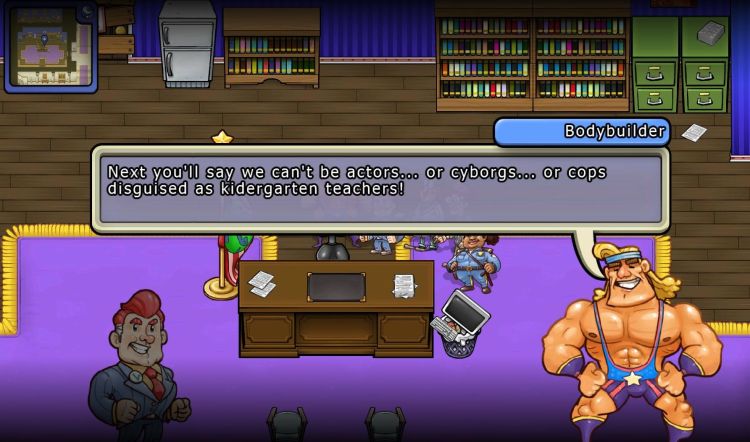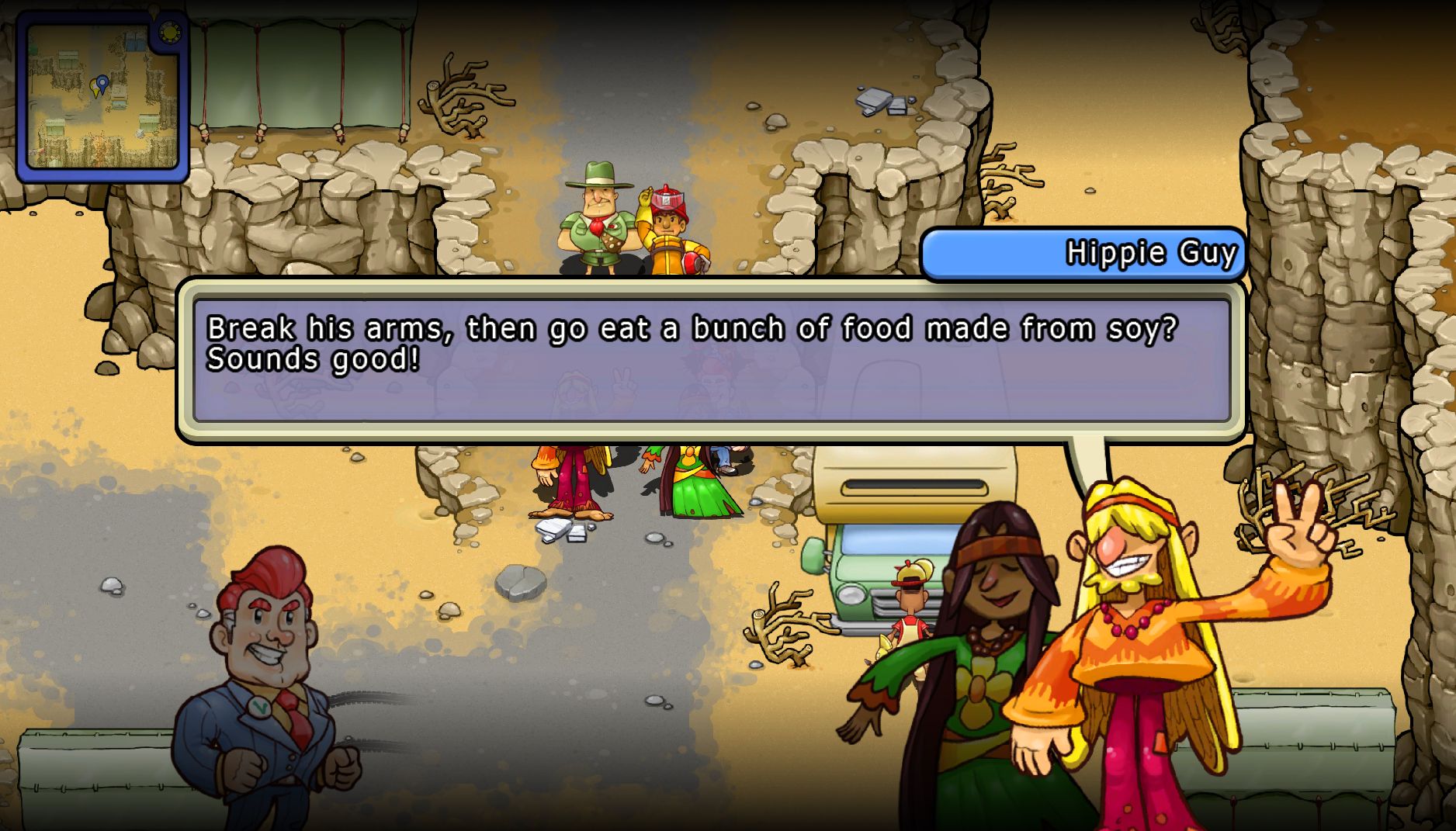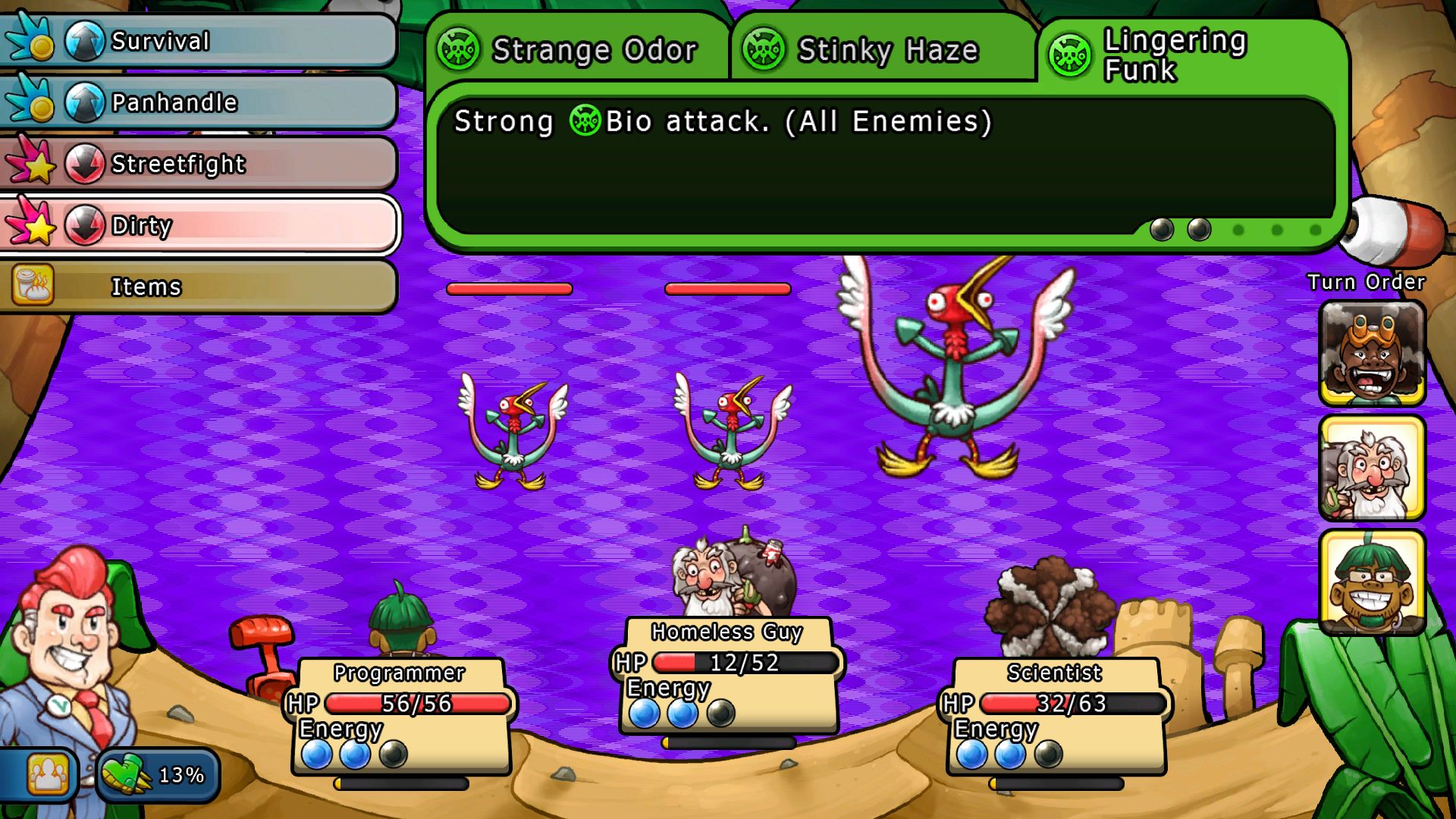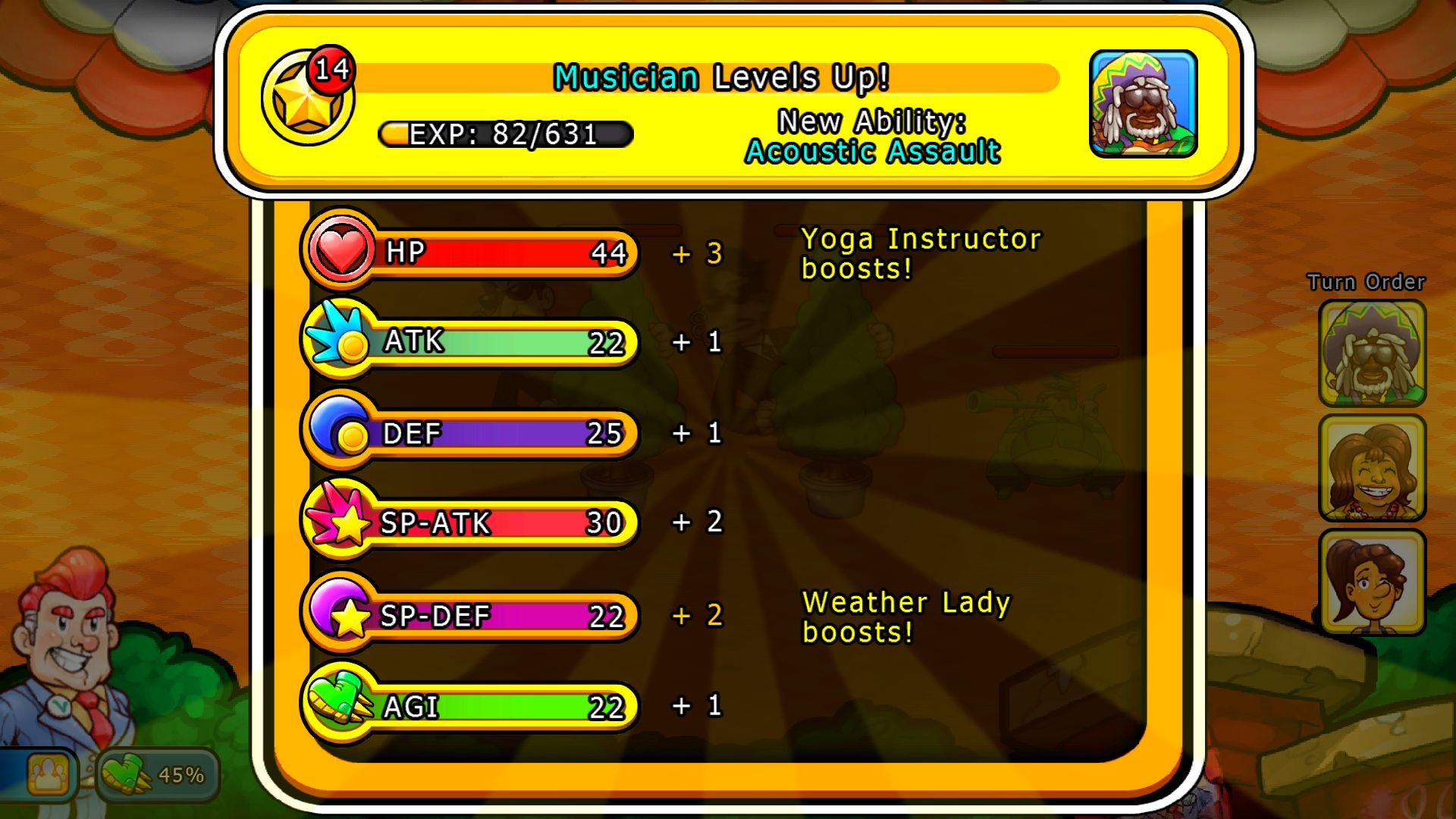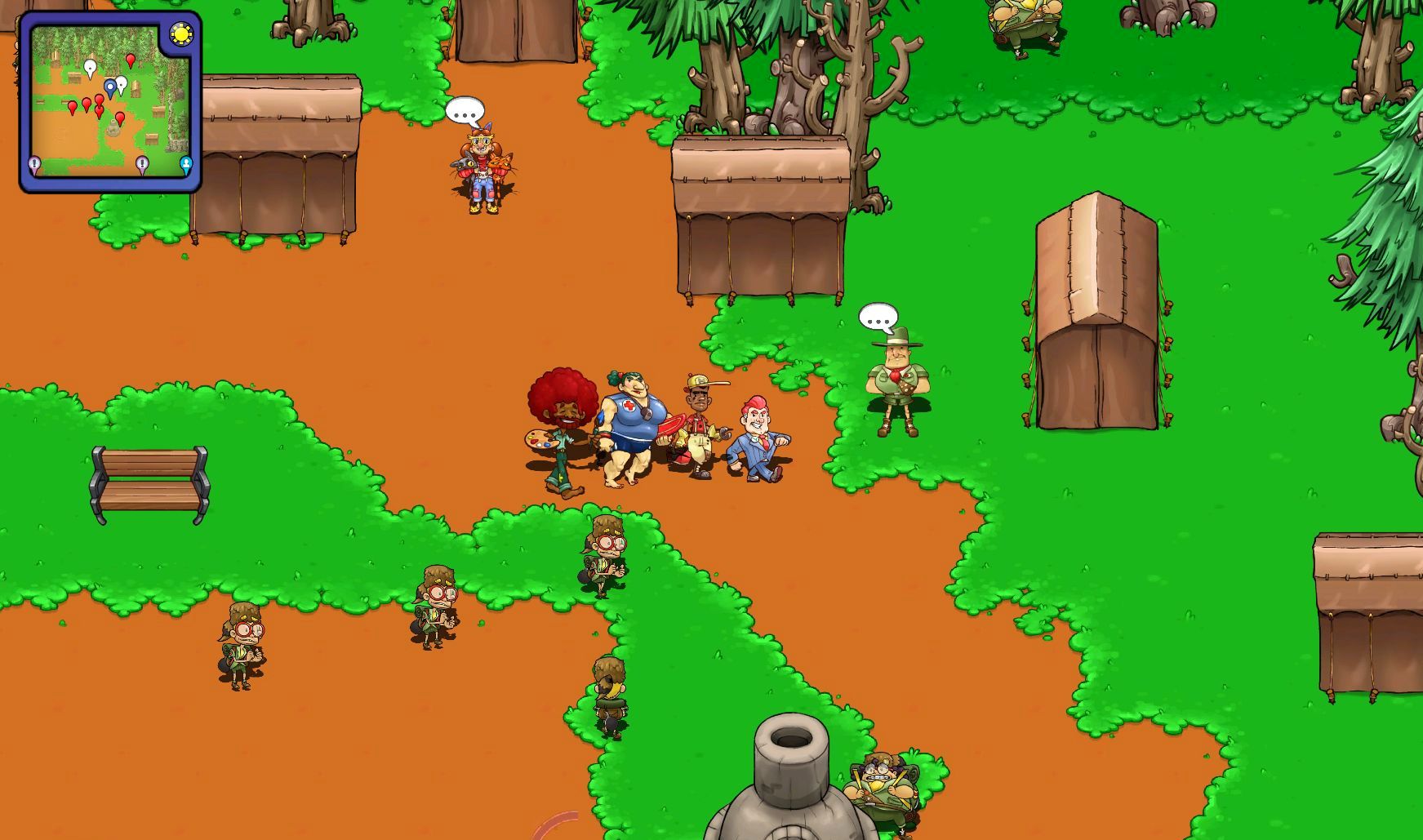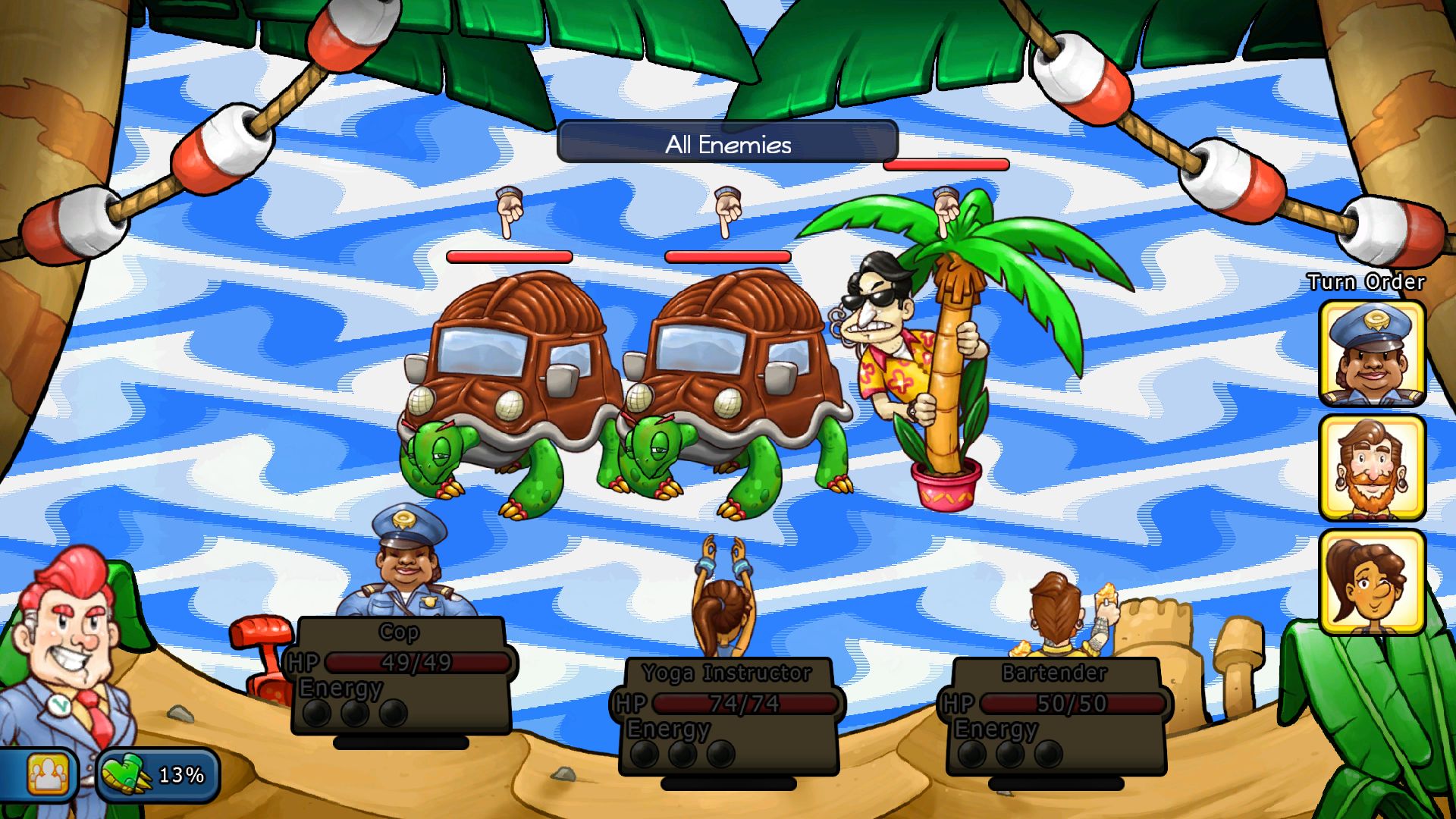Check out our Reviews Vault for past game reviews.
I’m pretty sure Joe Biden isn’t having to deal with this kind of thing.
Citizens of Earth, a new retro-savvy role-playing game from Atlus and Eden Industries (out Jan. 20 for PlayStation 4, Wii U, 3DS, PlayStation Vita, and PC,) sews you into the cheap suit of the Vice President of Earth. Specifically, it’s an Earth currently under siege from a throng of monstrous versions of everyday things and people. To avoid a global cataclysm, you must collect your constituents like Pokémon and use their vocation-based abilities to battle through hordes of foes. I play the PS4 to see if this VP was worthy of the office or if he needed a recount.
What You’ll Like
A planet of ass-kicking archetypes
The difference between an archetype and its dreaded cousin, the stereotype, is how you use the character or construct. In Citizens of Earth, you can assemble up to 40 different people from around the country, each with special moves based on their vocation. The Bodybuilder is a brute who primarily punches things, and the Gardener deals in biological chemicals and poison-laced attacks. They are playing to our preconceived notions so that we can play to their strengths.
Each of these citizens never rises above the one-note joke of their profession or personality quirks (the cheery Weatherwoman, your dorky little brother, etc.). Eden Industries manages to ring the maximum amount of charm from its large ensemble cast with granting most of their functional appeal in battle. You are only able to use three for a fight (fittingly, the Vice President doesn’t personally engage in the brutalizing,) and everyone levels up and gains new abilities individually. Thankfully, some of this game’s best laughs come from finding out each citizen’s newest and strongest moves.
Each one also adds a boost to everyone else’s skills upon leveling. Having your Mom in your party raises everyone else’s health an extra point with each level gained. It gives you a reason to keep cycling in different party members throughout, a balm for the consistent grind.
The constant jokes embedded in gameplay
I don’t mean it as an insult when I tell you that Citizens of Earth is at its funniest when no one is speaking. The main plotline and dialogue exchanges are serviceable, with a few chuckle-worthy zingers. Most of the time the script is acting at the level of a mediocre episode of an animated sitcom. The developers put their smartest and sharpest jokes in the gameplay.
Battles occur when you bump into enemies wandering each map or launch your party at them with a dramatic finger point. The actual fighting plays out in a separate window similar to the early RPGs on the Super Nintendo, albeit with the members of your party visible at the bottom of the screen. You almost feel like you can lull into old habits, if not for the flavor text.
Most of the time, the scrolling text in RPG battles are numeric indicators of your progress. Warrior did +5 damage to the Skeleton D, etc. But in Citizens of Earth, every attack adds a little bit of flair to the proceedings. When the Mascot citizen rallies your party to gain more experience, he “somehow gives a coherent speech.” When the Teacher citizen rattles off a sleep-infused attack, he “drones on about ancient civilizations.”
Citizens of Earth is full of little touches that make you take the time to read every little piece of information you stumble across. The Not-So-Secret Service men that are constantly sticking their heads out of out-of-place shrubs in the Capital become the Oh-So-Suntanned Service men when performing the same duties at an Executive beach retreat. Hippy dudes and chicks will reduce your party’s energy to the lowest amount currently held in a fit of appropriate socialized egalitarianism. Items and character animations also boast some common sense humor, like the escalating effectiveness of more expensive coffees.
We’re not dealing with the smartest wit in games — it’s more of an endearing, goofy sense of humor.
What You Won’t Like
The obnoxious interface and layout
Throughout my playthrough, it was hard to shake the notion that I was playing a mobile game prettied up for consoles and handhelds. That’s not due to any micro-transactions, although several features, like the background experience-earning of the Teacher’s tutoring, bare the stink of time-gates.
The interface is distractingly loud. Basic, bright blobs of color sit fat over far too much space. We get too little information over too much of the screen. The battle screen isn’t too bad (albeit a bit garish), with each characters’ options appearing as separate, pop-up menu scrolls. The constantly repeated character catchphrases are another matter, especially considering it has to pause for a half a second each time to play them, keeping the flow of battle at a consistent hobble. You can mute the voices, but that momentary stutter remains.
Navigating through your collected citizens and items after the fight is a chore from minute one. And through a menu that looks like it was built out of cheap plastic and rubber. You can move from the bottom option to the top one in a battle-scrolling menu, but not when you are going through the hundreds of sushi rolls and coffees you’ve amassed over the past 10 hours. You have to use each instance of an item individually, waiting for it to reload the scroll bar so you can flick from the very top all over again. For those that want to fully prepare for a difficult encounter with defense and special attack buffs, it’s a frustrating tedium.
Loading screens are about a second long, but frequent enough for you to tire of seeing the same main menu image reused over and over. The areas are diverse, but you’ll find yourself stranded in the many instances where you have no minimap. It was during these tedious marches that it crashed most frequently. My six fatal errors weren’t so distressing thanks to the generous autosaves, but I did nearly fall into a failed game state when I backed out of a main mission to follow a side plot. I lucked into the solution when I somehow managed to activate the ability of a citizen I hadn’t even recruited yet.
The rest of the art design is lively and varied, when you are close enough to see it. The default camera zoom is too distant in most maps to appreciate the way each citizen uniquely moves, the heavier ones with rolling gaits, the more militaristic ones with steady marches. You can change the zoom in-game, but managing to do that brings us to its worst offense.
It doesn’t respect your time
This Earth has a lot of space, but Eden Industries did not do nearly enough with it. More times than not, you discover a new area only to groan at the amount you have to tread. Especially with the default camera zoom most commonly placed at a helicopter view, you spend most of the time watching your tiny little avatars navigate grand empty canyons or cliffs, looking for the one and only dip in the dirt to let you descend to the lower valley with the exit to where you need to be. Later levels keep the vacuous spaces but fill them with more enemies gunning from your line of citizenry.
By far the most aggravating instance of needless padding comes from your citizens’ secondary abilities. Each of your 40 constituents has a move for navigation or aesthetics. Take the Programmer, who grants you access to a digital mainframe that connects to a few other places on the map. It’s a solid concept, if the designers didn’t run out of ideas on what to let everyone do.
The solution was to disguise menu options as secondary, unlockable abilities. Want to change the zoom on the camera? You have to find the Beekeeper, then usually travel to another part of the world to formally talk to her, and perform a lengthy mission for her to join. And this is if her mission area isn’t blocked off by two or three other stop-gaps requiring other citizens to bypass. And with you not having found the few characters to offer the game’s insufficient equivalent of fast-travel yet.
Backtracking through maps is almost as common an occurrence as battles, both of which ultimately become equally grating. You have the theoretical option to avoid any encounter you want outside of bosses, but the trial of citizens behind you rarely affords the privilege. Instead, navigating various maps becomes a slipshod game of snake, with you failing to loop your party tight enough around corners or curves to avoid the enemies sprinting toward you. Sending your party forth in the hope of getting a preemptive attack or outright ambush is even more finicky, your angle of approach oftentimes needs to be more precise than the movement controls allow.
In reality, you only need to acquire about a dozen or so citizens in order to beat the campaign. But like the kind of politician the Vice President of Earth aspires to be, Citizens of Earth knows how to tease you just well enough for you to realize how much of your time got wasted. You will spend a few extra hours early on, enamored by the ability to change the background music or the weather on the fly. But by the midway point, you’ll be on the hunt for anyone that looks necessary for plot progression and leave the rest for the postgame.
Conclusion
Citizens of Earth is a charming drag.
Eden Industries took almost every conceivable opportunity to add a sly joke in the middle of floating damage indicators or map exploration, and took it with aplomb. But the glaucoma-inducing choice of interface and the stretching of space and gameplay time beyond the point of breaking make this a hard game to broadly recommend. This would have been one hell of a 6-hour jaunt, but at upward of 20 hours for a basic playthrough, the amount of fluff is suffocating.
If you are the sort who goes far for a chuckle, Citizens of Earth can be marvelous for a couple of hours at a time. For those with less masochistic senses of humor, keep out of the politics on this one.
Verdict: 55/100
Citizens of Earth is out now for PlayStation 4, Wii U, Nintendo 3DS, PlayStation Vita, and PC. The publisher provided GamesBeat with a digital PS4 copy of the game for the purposes of this review.
VentureBeat's mission is to be a digital town square for technical decision-makers to gain knowledge about transformative enterprise technology and transact. Learn More
